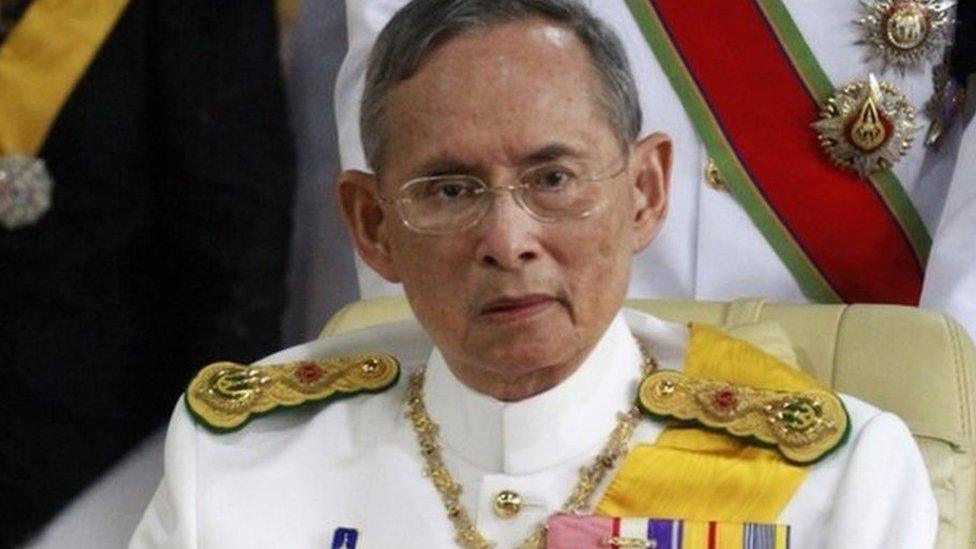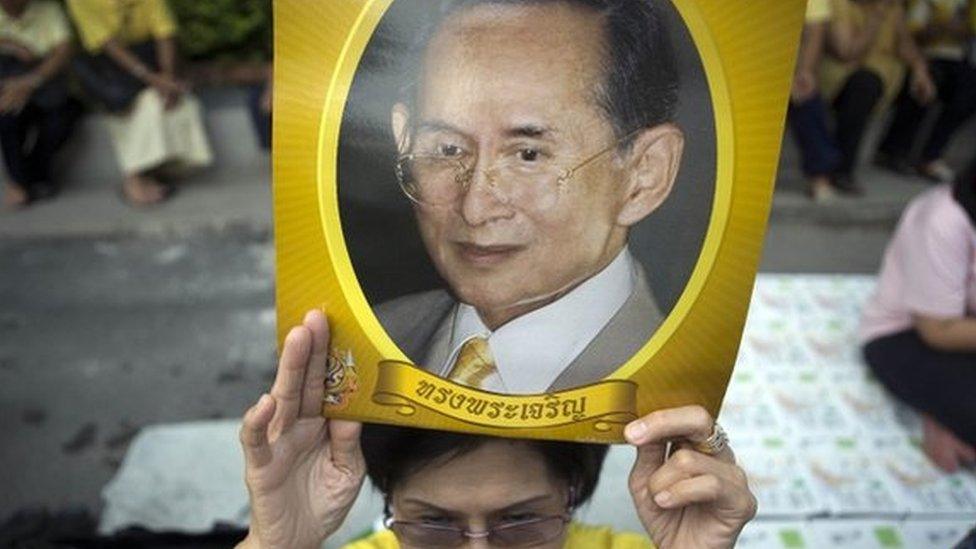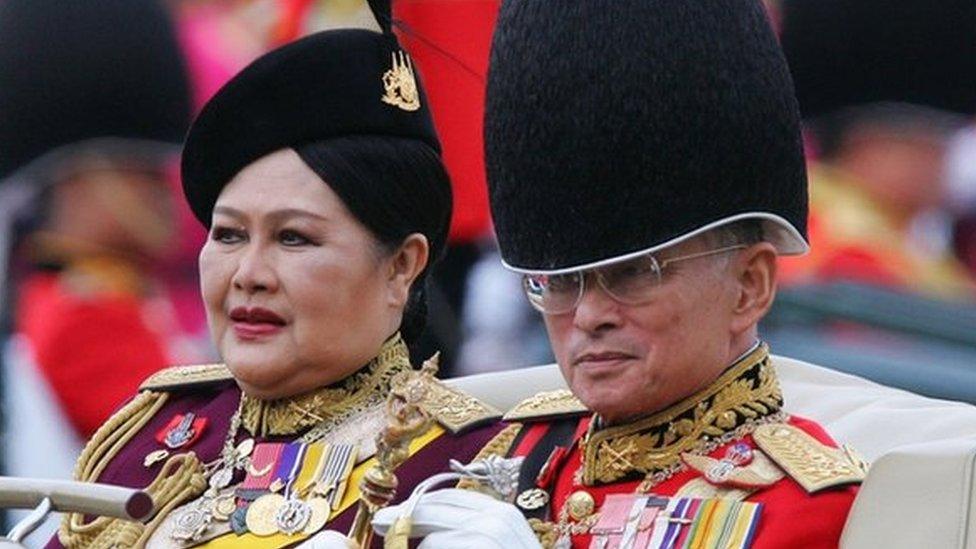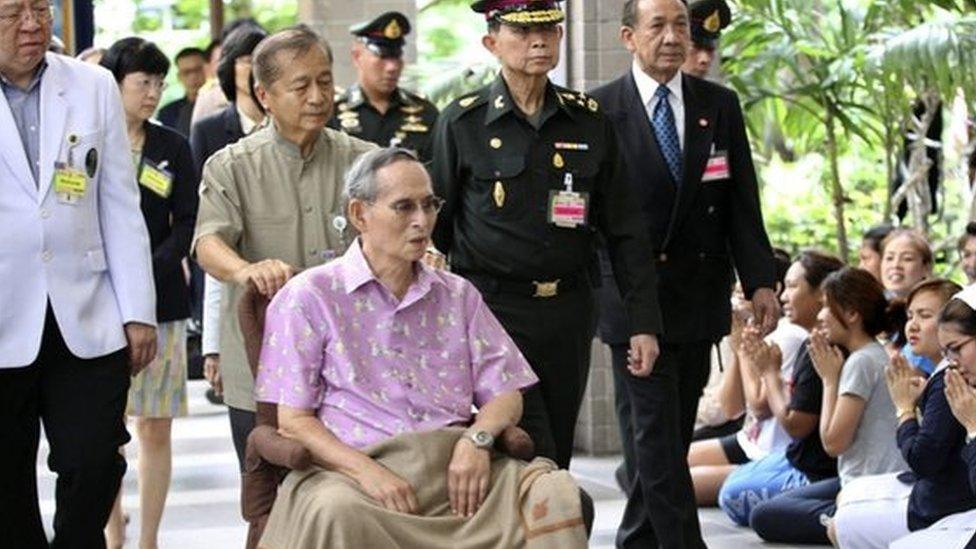Profile: King Bhumibol Adulyadej
- Published

King Bhumibol Adulyadej is the world's longest-reigning monarch.
Still widely-revered in Thailand, the 88-year-old king was in the past seen as a stabilising influence in a country which, during his reign, has seen numerous military coups, 19 constitutions and even more prime ministers.
Though he is a constitutional monarch with limited powers, many Thais regard him as semi-divine, and his usually opaque public utterances are minutely dissected for advice to his people.
Officially the King is above politics, but King Bhumibol has intervened in times of high tension, and is credited with finding non-violent resolutions to some crises.
However critics argue that the King has endorsed military takeovers, and at times failed to speak out against human rights abuses. During the political turmoil of the past decade some supporters of ousted Prime Minister Thaksin Shinawatra have accused senior royal officials of taking sides against him.
Royal projects
King Bhumibol Adulyadej acceded to the throne on 9 June 1946 after his brother, King Ananda Mahidol, died in a still unexplained shooting accident at the Royal Palace in Bangkok.
He was born in Cambridge, Massachusetts, where his father was studying, and he was later educated in Switzerland. He returned there to finish his studies before returning to Thailand where he was crowned in May 1950.

King Bhumibol remained silent during Thailand's most recent political crises and coups
The status of the monarchy had been in decline since the abolition of absolute monarchy in 1932, and then the abdication of King Prajadhipok, King Bhumibol's uncle, in 1935.
In his early years King Bhumibol was overshadowed by a series of powerful military leaders. But with the support of other royal princes and sympathetic generals he rebuilt the monarchy's profile, making a series of tours to outlying provinces, and through numerous royal projects that established his lifelong concern with agricultural development.
In 2006, then UN Secretary General Kofi Annan presented him with the United Nations' first Human Development Lifetime Achievement Award.
The current public reverence for King Bhumibol appears genuine, but it has also been carefully nurtured by a formidable palace public relations machine, and by harsh "lese-majeste" laws that punish any criticism of the monarchy with up to 15 years in prison.
Interventions
King Bhumibol's first public intervention in Thailand's chaotic politics occurred in 1973, when pro-democracy demonstrators in Bangkok were fired on by soldiers and were allowed to shelter in the royal palace, a move which led to the collapse of the administration of the then Prime Minister, General Thanom Kittikachorn.
But he failed to prevent the lynching of left-wing students by paramilitary vigilantes three years later, at a time when the monarchy feared the growth of communist sympathies after the end of the Vietnam War.
In 1981, King Bhumibol stood up to a group of army officers who had staged a coup against the prime minister, and the king's personal friend, General Prem Tinsulanond. Units loyal to the king then retook Bangkok.

King Bhumibol acceded to the throne in 1946 after his brother died in a shooting accident
In 1992 he again intervened when dozens of demonstrators were shot after protesting against an attempt by a former coup leader, General Suchinda Kraprayoon, to become prime minister. The king summoned General Suchinda and the protest leader, retired General Chamlong Srimuang, and had TV cameras film him scolding them while they were on their knees. Electoral democracy was restored after than, and a new constitution written.
During the crisis that erupted over the leadership of the then Prime Minister Thaksin Shinawatra in 2006, the king was frequently asked to intervene but insisted this would be inappropriate. However, his influence was still viewed as pivotal when the election Mr Thaksin had won that April was quickly annulled by the courts. His precise role in the coup that deposed Mr Thaksin that year is unknown, although his advisors say he was not informed about it in advance.

The Thai king spent nearly four years in hospital after being admitted for a lung infection in 2009
In recent years the king's name and image continued to be invoked by royalist protest groups trying to unseat pro-Thaksin governments.
However the king himself was in poor health, and remained silent. Army chief Gen Prayuth Chan-ocha subsequently seized power in another military coup in May 2014.
Three months later, in August, King Bhumibol formally endorsed Gen Prayuth as the new prime minister.
Ill-health
In his younger days, King Bhumibol enjoyed a wide variety of pursuits, including photography, playing and composing songs for the saxophone, painting and writing.
He even received a patent for his development of an artificial rain-making technique.
The king has suffered from increasingly frail health in recent years, and has spent much of his time in hospital after being admitted for a lung infection in September 2009.
- Published19 May 2015